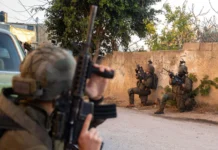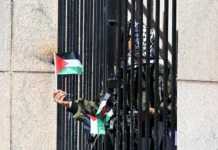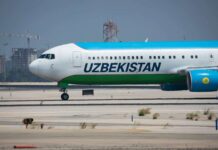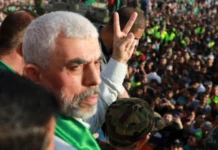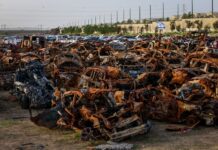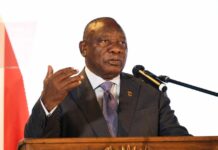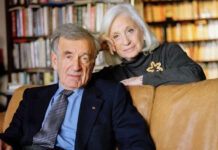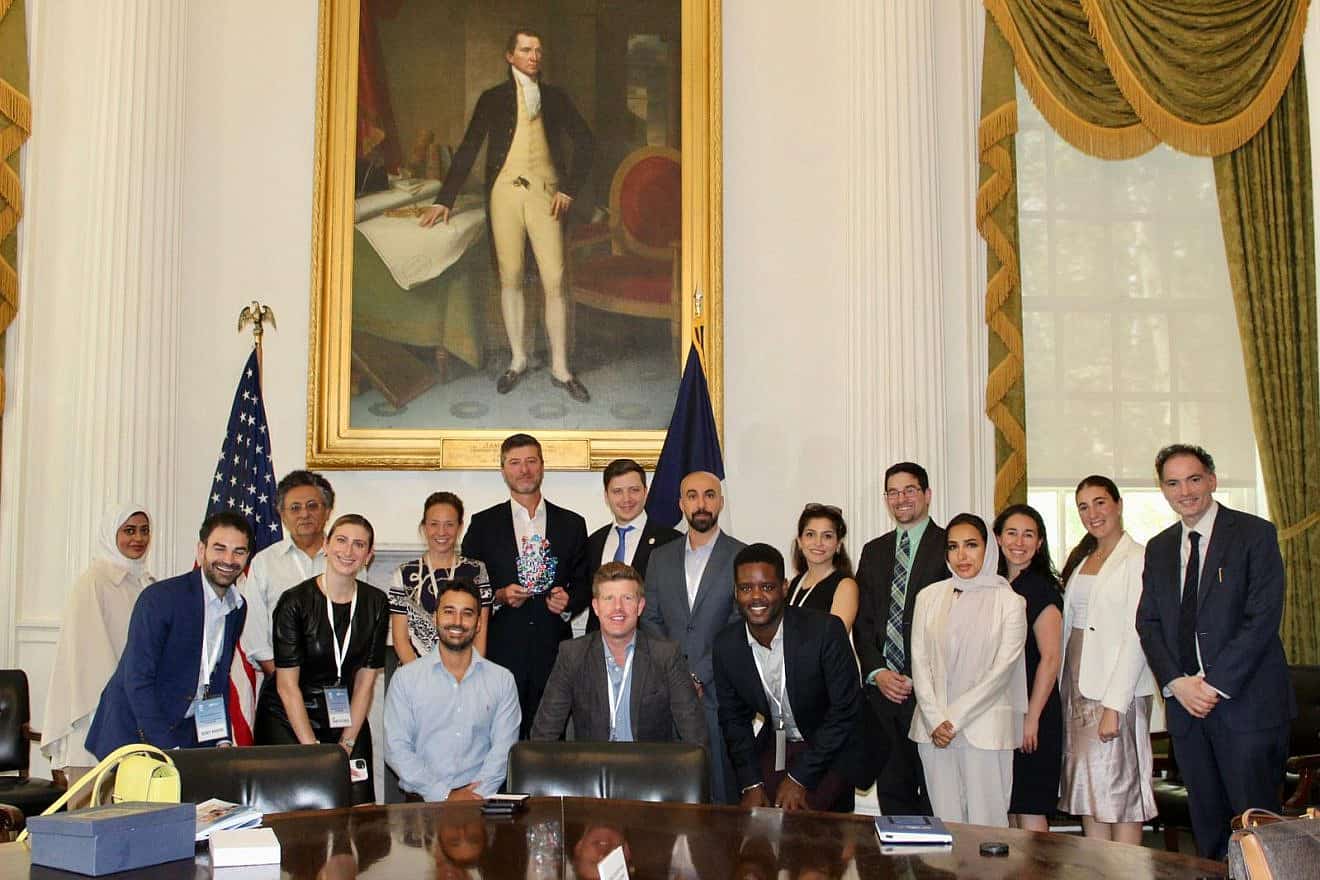The hope of the Abraham Accords was that its biggest impact would be felt on a people-to-people level. As the third anniversary of the signing of the original pact approaches, a delegation of young professionals from Israel, the United Arab Emirates, Bahrain and Morocco are touring America’s East Coast, looking to put that hope into action.
ISRAEL-is, an Israeli NGO dedicated to broadening the perspectives through which the world sees the Jewish state, is teaming with the American Jewish Committee to sponsor this year’s Abraham Accords Anniversary Delegation, which is meeting with a raft of thought leaders, professional executives, governmental leaders and key legislators to grow the fruits of the accords, particularly in the fields of tourism and the environment.
“We’re collaborating with a bunch of young, very brave leaders both from Israel and in the Arab world, and we want to impact the people who make decisions here in America that hey, this is the right place. This is the right agenda,” Nimrod Palmach, ISRAEL-is CEO, told JNS. “Let’s continue to support the Abraham Accords effort and believe in young leadership that are leading the way in a path of normalization, and hopefully peace.”
JNS met up with the delegation on Friday morning at AJC headquarters in New York, where they had meetings with Arab-American women leaders, along with a New York State tourism official and an environmental defense academic. The group had only met each other one day earlier.
“It’s been very interesting. It’s eye opening. We’ve learned so many things, especially since we just finished one day,” Leena al-Ayoubi, a Bahraini artist and designer and founder of NFT MENA, told JNS. “But in this one day, we’ve learned so much about the Jewish community, about New York tourism and especially Middle Eastern tourists.”
Ruth Moatti, director of women’s hi-tech advocacy organization FemForward and a former Israeli United Nations youth delegate, told JNS that discussions with her delegation cohorts have already reached the planning stages.
“I think that I found my future partners. We’re already talking about projects that we’re going to do around COP 28,” she told JNS, referring to the 2023 United Nations Climate Change Conference to be held this winter in Dubai. “And it’s amazing to see that other people from different countries are excited and passionate about the same things that I’m passionate about. So yes, it’s just the beginning, and we have a long way to go in this delegation. But I’m very optimistic and very happy that I found new friends.”
Noam Bedein, an environmental advocate and director of the Dead Sea Revival Project, says the Abraham Accords opened up key avenues for dialogue in his field, in which long-term solutions to key issues can only be found on a regional basis.
“Right when the Abraham Accords began, we started getting invitations from officials in the UAE and Bahrain to come explore their challenges in terms of environment and water scarcity, to learn about their methods and how they’ve been dealing with conservation efforts,” said Bedein. “It’s been a fascinating journey of just learning from one another on a deeper level, using these values of sustainability, conservation, appreciating creation and finding that this is a way to bridge and get close to people.”
The American Jewish community was long conducting behind-the-scenes discussions with Arab leaders about advancing cooperation between Israel and the Gulf, years before the Abraham Accords became a reality.
Reva Gorelick serves as the program director at AJC Abu Dhabi: the Sidney Lerner Center for Arab-Jewish Understanding. She was among the first Jews to relocate to the UAE following the signing of the accords and says American Jewry is well-positioned to serve as a facilitator of discussions to advance the prospects of the normalization agreements.
“With this delegation, we start with conversations, we start with introductions, but the conversation quickly switches to tachlis [a Hebrew word for getting things done],” she told JNS. “How many people are we going to bring to Dubai for COP 28 and how are we going to engage Israelis in those conversations, just for one example,” she said. “In every conversation that we’re having with this delegation, it starts with building that personal connection, and it moves very quickly into what we are going to build from here, and not just what we are going to talk about.”
The UAE is represented in this week’s mission by three professionals with backgrounds in aviation, oil and gas and sustainability, respectively. Morocco’s delegate, a tourism and hospitality manager, will join the delegation in Washington on Monday.
According to Palmach, all were selected on the basis of several factors.
“I would say the first one is motivation, and then the courage to be a path leader, to be people that are willing to be first,” he said. “And then relevant to the themes that we chose, we wanted to bring young leaders that are actually professional in those fields, either in tourism or environment or even the connection between those two.”
The delegation is set to meet in Washington with State Department officials, including Dan Shapiro, special adviser for regional integration, and Daniel Benaim, deputy assistant secretary of state for Arabian Peninsula affairs. Several members of the U.S. House of Representatives’ Abraham Accords Caucus and key House staff are also slated to speak with the group, as are White House and National Security Council officials. Abdulla Al Khalifa, the Bahraini ambassador to the United States, will host the delegation on Tuesday evening.
Palmach says he wants from those speaking with the delegation “mostly recognition that this vision is correct and this vision needs to be invested in. But of course, if there are people who believe in this action and want to take part, you’re welcome on board.”
Beyond making new contacts and creating friendships, al-Ayoubi told JNS she is looking to provide the Bahraini perspective.
“We have a lot of insights and ideas, how to make this work more, and how to enhance tourism and trust between the two countries. I’m really hoping that at the end of this experience, we can achieve that,” she said, adding that “I’m really hoping that they understand where I come from and my culture. Bahrain is a very small island and we’re a small population, but we have so many stories to tell. We have a very rich culture, and I’m here to represent that and give them all the information they need.”
The Abraham Accords’ three-year anniversary brings about an interesting dichotomy. For some, the initial excitement has worn off. The “normalcy” part of normalization means the business of day-to-day relations has sometimes replaced the adrenaline flowing at the outset of the agreements. That has both its upsides and pitfalls.
“At the beginning of the Abraham Accords, the excitement was so tremendous and every single person felt very anxious. But it’s become more normal, and we [in this delegation] immediately hit it off, which is amazing,” said Bedein. “Just on the first day, we made so much progress by just having a space for a deeper conversation. This is our way to build up for the future.”
But it also means that it’s time to get down to business, and business requires results.
“I think the excitement is still there. But in regard to actual programs and projects that we can pursue together, there’s still a long way to go, and that’s what keeps me excited, because I know there’s still a lot to achieve,” said Moatti. “I’m still finding my partners and building those connections. So it’s nice that we can be out here and participate in such a delegation. But the excitement is about what the future holds.”

